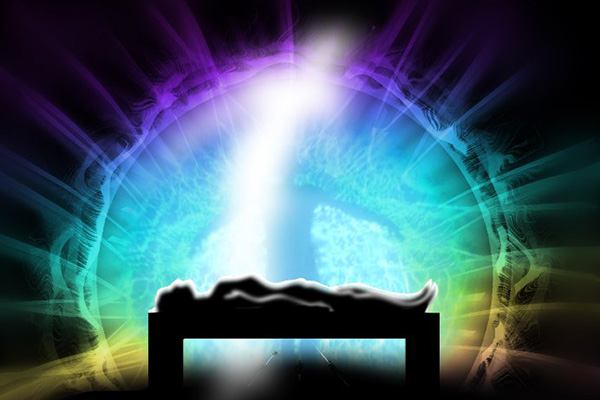soul evolution
Letting Go Is The Key To Past Life Encounters
 In my psychic readings over the years, I have had many of my clients around the world asking about a special person in their lives. Often the thoughts and feeling they experience with this person are so real, and the connection feels very strong right away.
In my psychic readings over the years, I have had many of my clients around the world asking about a special person in their lives. Often the thoughts and feeling they experience with this person are so real, and the connection feels very strong right away.
The way they explain the feeling to me is that they feel like they have known that person their whole life. If they have just met very recently, and feel this kind of connection, there is often a past life connection or soul agreement. Once you make this kind of connection with someone then you have a fair chance to see where the relationship leads to.
Previous relationships that ended bad, because there was no lasting connection, can have a negative influence on soulmate connections from past lives. Many of us unfortunately want to hold on to such bad learning experiences.
When we are unwilling to let go it is often because we are scared to be hurt again. Then we have someone special enter our lives from a past life connection and we sometimes make it hard for this new person, while they really are not the one to blame for all the pain we experienced in the past with others.
Letting go of the past, and forgiving and moving on, seem so hard to so many people, but it can be so easy when there is someone special in your life to have new beginning with.
Our past lives experience also go beyond meeting someone new. One good example is visiting a location that seem familiar to you. Our past lives, like our dreams, are mystical glimpses into other worlds. We may not always know why we see what we see, but when we do it’s an enlightening look into a past we once lived that offers us personal growth and opportunity for healing.
The Babysitter’s Near-Death Experience
 While I was working out at the gym one day, I saw a little old lady who used to babysit me and my brothers when we were little children. I will never the wonderful times we had with her. She was always making it so much fun. She wasn’t on the phone all the time or watching television. She wasn’t ignoring us kids like so many of the other babysitters my mother sometimes hired for us.
While I was working out at the gym one day, I saw a little old lady who used to babysit me and my brothers when we were little children. I will never the wonderful times we had with her. She was always making it so much fun. She wasn’t on the phone all the time or watching television. She wasn’t ignoring us kids like so many of the other babysitters my mother sometimes hired for us.
When I spotted her and her daughter in the gym, I walked over to greet her, and told her that I remember her very well. I also thanked her for giving me some wonderful memories and teaching me so many valuable life lessons. The one thing I specifically remember her telling me was to always be careful about what we “put into our minds.”At a young age she had already made me realize that what we think about can either help us or harm us. I have always held on to that wisdom in my life. Because it is truly worth more than gold.
One time, I asked her how she knew so much about things. She looked at me and said,“Moon, you know what, I died once.”
“What? No way!” I responded. I went to catholic school growing up, and near-death experiences were certainly not the kind of thing we were learning about in class.
“Yes, I was in the hospital,” she continued. “I had a major operation and I could not wake up afterwards.” Apparently, she had flatlined during surgery and they had struggled to revive her.
“I am very lucky to be here,” she said and then shared some very interesting things with me about her near-death experience (NDE). I still remember that when she first left her body her parents were both there to meet her and she could hear loved ones on the other side of the tunnel having fun. I also remember she said she felt like a ball of light at the time and that it felt so good. The next moment she was being pulled back into her body. Continue reading
The Spiritual Path Of The Wandering Nomad
 A recent chat with a relative about my plans for the future reminded me of a first cousin who once remarked on my nomadic lifestyle, “You really don’t seem to stay in one place for more than ten minutes!” A friend once also pulled my leg about needing to buy a new Rolodex, because I was filling hers up with all my constantly changing addresses from all over the world (those were the days before contacts could be more easily stored on a smart phone).
A recent chat with a relative about my plans for the future reminded me of a first cousin who once remarked on my nomadic lifestyle, “You really don’t seem to stay in one place for more than ten minutes!” A friend once also pulled my leg about needing to buy a new Rolodex, because I was filling hers up with all my constantly changing addresses from all over the world (those were the days before contacts could be more easily stored on a smart phone).
According to Astrology, I was supposed to get settled early in life as a Cancerian, by creating a permanent home and haven, and having a family with several children. Well, this was never the case. I thought the desire to settle down might come as years passed, but it never happened.
I also never became broody. I would become motherly over a puppy, kitten or other young animal, but I never felt the desire to have children of my own.
Over many years of personal growth and spiritual exploration, I have gained a deeper understanding and greater clarity regarding the choices I have been making in this lifetime.
Astrologically, for example there is a strong Gemini influence in my natal chart which is contributing to my restlessness, as well as Leo fueling my creativity and my sense of determination. I am not am expert astrologer by any stretch of the imagination, but the way it was explained to me by a professional astrologer made perfect sense.
A past life regression session also revealed that I had conceived many children in previous incarnations and that the desire to have offspring of my own this time around was not a part of the blueprint.
I found the matter particularly challenging when I was younger. I would be dating a wonderful guy who really wanted to settle down with me and longed to have a family, but the mere thought of having my wings clipped by marriage and motherhood was always unthinkable to me. So, many good relationships ended because we really were not on the same page about settling down and having children.
Blessed With The Knowing Of The Divine Feminine
 In the Greek myth of Pandora’s Box, an inquisitive woman decides to open a mysterious jar left in the care of her husband. In the process, she releases the many curses of sickness, suffering and death upon humanity. Pandora desperately tried to close the lid of the jar, before all the evils of this world escaped, but it was too late. Only one item remained, and that was hope.
In the Greek myth of Pandora’s Box, an inquisitive woman decides to open a mysterious jar left in the care of her husband. In the process, she releases the many curses of sickness, suffering and death upon humanity. Pandora desperately tried to close the lid of the jar, before all the evils of this world escaped, but it was too late. Only one item remained, and that was hope.
In the similar Biblical tale of Adam and Eve, an inquisitive woman is enticed to eat the forbidden fruit of the Tree of Knowledge, causing the fall from grace of humanity. As a result, all sorts of sicknesses, struggles, and sin have been afflicting humanity ever since.
As we shift from the astrological Age of Pisces into the Age of Aquarius, achieving increased spiritual awareness and enlightenment will become one of humanity’s greatest improvements. We will become more certain of our soul’s destiny, safety, and calling, and no longer have to work through our petty human fears and worries by leaning on the crutches of dogmatic religion and the uncertainty of Pandora’s hope.
With sufficient spiritual practice and energy work, hope can be transformed into a simple knowing, and faith or belief can become complete conviction. One’s soul purpose becomes defined, opening the crown chakra like a sports dome at a baseball game. We become sure of our calling and destiny. We are ready to enjoy the blessings.
Through our daily self-care journey and meditation, we can purify the crown chakra to magnify our purpose. We can stay calm in even the most difficult circumstances. We become a benefit to society at large, creating a shelter for those less fortunate.
If we dare to raise our vibrations significantly, we may help humanity, the offspring of Eve and Pandora. Not everyone is blessed to have the wisdom or resources to ascend. We can be the helping hands for those souls, helping them, guiding them to enlightened knowing and spiritual wisdom.
Let Us Be Kind To One Another
 We live in a strange world where we place so much importance on who we know, what we own, what we be believe, who we vote for, and (as silly as it is) what we look like. Instead, we all should be placing more value and importance on how we treat one another, and not be so unkind, selfish, and judgmental. Not to mention all the distractions created by modern technology and materialistic pursuits.
We live in a strange world where we place so much importance on who we know, what we own, what we be believe, who we vote for, and (as silly as it is) what we look like. Instead, we all should be placing more value and importance on how we treat one another, and not be so unkind, selfish, and judgmental. Not to mention all the distractions created by modern technology and materialistic pursuits.
It is very hard for anyone to be truly spiritually aware and live a life of higher consciousness in today’s mad world. Living in a holy way, like the Saints of the Catholic faith, is almost completely out of reach these days. The Saints got it right first time around, and they are an example of how to live in a selfless, ‘do unto others’ kind of way.
We will ultimately be held accountable for every thought, word, action and deed. I think it is very egotistic to think that all that is needed is one lifetime around and then ‘ta-da,’ you get granted entry to eternal bliss. Just for claiming your are religious, a ‘good person,’ or spiritually ‘evolved’? Never! Doesn’t work like that.
Do you consider yourself a saint? None of us are. I certainly don’t consider myself one; not by a long shot. But one does notice the self-righteous attitudes of some among us, like they are better than the rest. Spirit doesn’t condone that kind of pride one bit.
Faith and spirituality is indeed a personal choice for every person. But there are some undeniable, eternal truths and universal laws that apply to all of us, no matter what we choose to be believe or who or what we worship.
For me faith and spirituality is about believing and doing what the Bible recommends. But it is not just about attending church services on Sundays, and then going against God’s Word the other six days. It’s about being humble, being pure of heart and mind, and being kind to one another. We are all connected and until we begin treating everyone as our neighbor we shall know no lasting peace or harmony.
The Transformative Power Of Silent Meditation
 Spirituality is perceived in the East with many similarities to what is believed in the West, but with an entirely different way of talking about it. For example, in terms of Easter philosophy a person’s individual identity is not their ego.
Spirituality is perceived in the East with many similarities to what is believed in the West, but with an entirely different way of talking about it. For example, in terms of Easter philosophy a person’s individual identity is not their ego.
Identity is the journey of self-discovery that consists of affirming one’s individuality and being able to express everything that we are. This can be achieved through meditation, prayer, or various other spiritual and recreational practices that clear the mind through engaging in an activity that soothes us and brings us into silent contemplation.
Silence does not detach us from our soul essence. On the contrary, it allows us to be fully present and completely ourselves, without the limitation of words and actions. It is not aimed at denying our true spiritual nature. On the contrary, it is a time of authentic self-awareness and beingness.
Different Buddhist traditions refer to the natural state of mind as a state of enlightenment. In the Sanskrit and Tibetan traditions, we also find terms that speak of a clear, open mind. In Tibetan philosophy, enlightenment or awakened energy is called byang-chubs – literally purity and wholeness.
Being calm, at ease, and silent constitutes a state of mind that would happen naturally unless something is bothering us. These internal obstacles cannot be blamed on others or our external reality. Life is always complex and rarely calm.
In fact, these obstructions are seen as being nothing but habits, the result of karma, that obstruct the free and unconditional luminosity of the mind, like clouds that cover the sun on a summer day. Karma does not mean punishment. It is the result of previous actions. They are the result of what we do and what happens to us.
The Many Deaths And Rebirths In Your Lifetime
 You have already died many deaths. Many versions of you will ‘die’ in this lifetime. And, many versions of you will be reborn.
You have already died many deaths. Many versions of you will ‘die’ in this lifetime. And, many versions of you will be reborn.
Of course, you have also passed through the veil between this life and the next for many past lives. But in this case, I am referring to ‘deaths’ we suffer in this lifetime.
We can identify these dramatic changes, transitions, shifts, or ‘deaths’ in our astrological chart. Your Saturn Return, for example, occurs around the time of our 30th birthday. Our Saturn Return forces us to take an honest look at everything we may have been avoiding until now. It forces us to make much needed changes and improvements. It is the ending of our youth and the birth of our new adult self.
We do not remain the same person throughout our lifetime. Our goals, ideas, and life lessons all serve their purpose until they are phased out to let in new information, new ideas, and new opportunities for growth. If we do this right, life keeps changing us. We continue to grow and expand.
For this purpose, it is wise to interact with people who have different beliefs, practice other religions, and have other political affiliations compared to our own. And more importantly, to really listen to them. We must allow all the information in and trust our intuition to let our beliefs and understanding of life continuously evolve.
Our life experiences constantly challenge and change our ideas, goals, and views. We are constantly shedding our old skin. Just as our body changes every day we are alive, so does our soul. We take in every experience, whether we know it or not. It’s like adding ingredients to a recipe.
Embrace these deaths and births along your life path. They are needed for your soul growth and spiritual expansion. I’ve witnessed over the years some people really fighting change and resisting growth…and it always makes them miserable. Fluidity and acceptance are spiritually essential. Simplicity will bring you inner peace.